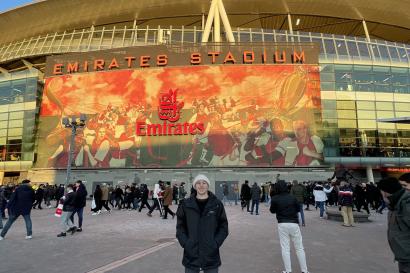The last time I wrote in this space, it was about my longing to find my language in Ireland. It’s been less than three weeks since I authored those words, a mere seventeen days of losing myself in the streets of a city, of running along a canal where I’ve watched a child feed the pigeons, seen a boy and a girl kiss under a bridge. Yet already, when I remember those words, I feel a need to revise, as though I’ve become a bit itchy under a layer of my own bias and blindness that I’ve only just begun to feel.
Last week, in the first session of a course I’m taking on the Irish short story, the instructor asked us to write about the first moment of our time here in which we were aware of the presence of another language. I put my pen to my chin and thought about that, tried to remember when I first heard a passerby talk about “good craig” (which means, for the record, good fun) or wish me, “Cheers!” I tried to remember the first bit of English I’d heard that wasn’t quite the English to which I am accustomed, the first time “trolley” or “lift” or “chips” didn’t match up precisely with what I expected it would.
When the professor, Dr. McMahon, asked a few students in the class to share and they described their encounters, I realized that I’d gotten it all wrong. My error really, boiled down to this: that the professor said we were going to talk about language, and I proceeded on the mistaken assumption that English is language, and not just one of them.
What my professor was talking about wasn’t Irish English, a slight variety of my own American English, only more musical, less punctuated with ums and likes. He was talking about Irish, Irish Irish – what, in American English, people tend to call Gaelic.
It wasn’t that I hadn’t noticed the existence of this other language. In fact, on the morning that I arrived at the Dublin Airport, jetlagged and sleep-deprived, the first thing that I perceived as distinctly different from America and certainly different what I’d expected, was the signs. When I traveled abroad before, to Holland and Uganda, I expected the coexistence of multiple languages, expected an accompaniment to the English I’d always known. I thought I’d know the language of Ireland, thought I’d be able to make it mine, believed, perhaps, that it already was.
But the airport was everywhere directing me in two different ways and the train I take four days a week to reach my internship announces the locations of the stops twice and the streets signs are all similarly bifurcated, once in a way I can understand, and once in a way that I can’t. And perhaps the oddest thing about all of this is that in all of these places, Irish isn’t made secondary to English, isn’t made a complement to the main language, in smaller font, less bolded, almost hidden, ceremonial. When the two languages are written together, Irish always comes first.
I commented on this the very first day in the airport to one of girls in program with whom I was sharing a taxi. I told her that it surprised me, because I’d looked up Gaelic before coming here and thought that only a small portion of the population really spoke it. She said that it was probably political, and I thought that was probably right.
It is right, I suppose, in a sense. Today, hardly any Irish people actually speak Irish as their first language. In fact, according to my short story professor, only about 3% of the island’s population does. There are more people here, he told us, whose first language is Russian than people who grew up with Gaelic on their tongues.
So if Irish is everywhere on the city streets, it isn’t because it’s precisely and practically needed. It’s there, perhaps, to make a sort of statement about Irish independence, still so recent after centuries and centuries of chafing under British rule. (The first Anglo-Norman king to invade Ireland, Henry II, did so in 1169.)
But the presence of Irish is political on a deeper level, too, the way language is always political, because you can never exercise so much power over something, over someone, until you have the power to name it.* The language you have at your fingertips shapes your ability to name it, determines your ability to detail and describe. I only know English. Without the contents of Webster’s dictionary, I am nothing – I am not even nothing, because nothing is a word. I have one-dimensional vision where a lot of people can see in two or three or four dimensions. I am lodged in English. I forget, sometimes, that anything else exists.
That says something, too: something about power, yes, but also, something about its sinister sister, privilege. Before my short story class, I had already begun to let the train announcements fade into the background, to let the lettering of the street signs dissolve into pretty patterns. And I was able to do that, able to forget that the whole world is not my world, because I come from a country (and succumb to its biases) that sometimes purports to make itself the world, in a sort of ever-expanding imagined manifest destiny.
I came to Ireland to study English – to study Yeats and Wilde and Joyce and Bowen. There’s a certain amount of hubris in that, I think, in coming to a country to study only one of its languages, especially since I entirely overwrote the other. I’m not the only one to edit Irish out, of course. The British did it for centuries, in a way that was utterly brutal. We read a poem in class called “Grafted Tongue,” that speaks to this. The poet, John Montague, writes:
"(Dumb,
bloodied, the severed
head now chokes to
speak another tongue -
As in
a long suppressed dream,
some stuttering garb -
led ordeal of my own)."
It goes on, describing the pain of losing a language, of having it stolen from you. But the story of the Irish language isn’t just a story of sadness, of loss, of defeat, and the story of English isn’t just that of oppression. Language can strip and bury and kill, but it can do other things, too. “Grafted Tongue,” after all, is written in English, and there’s terrible pain in that, but also something else, too, something that Oscar Wilde gave words (English words) to when he said, “The Saxon took our land” – and, he might have added, our language – “and made it desolate, we took their language and added a strange new beauty to it.” Yeats and Wilde and Joyce and Bowen and countless others among the Irish writers who have made the literary history of this island so great – they all did so in English.
This doesn’t erase the ugliness of what the British Empire did. This doesn’t revise the brutality of what English, as a language, has done over its long history to Irish and Ojibwe and countless others, what it still does today, still an overwriter. But if there’s some evil in the reality that we cannot perhaps ever entirely erase our mistakes, ever entirely eradicate what we would like to revise, there’s beauty in that, too, because some things ought not be erased, not be stamped out. Irish can’t ever really disappear. It’s suffused in the English in this country, even if in ways that seem untranslatable. And if revising can’t undo the past, it can write toward a better present, a better tomorrow.
*(I think a fantasy book I read once might have made this argument. It might have been Eragon. Regardless, I still think it’s true.)

Chelsea Thomeer
I'm a rising junior at Williams College majoring in English and political science. I love reading and running, Jane Austen and J.K. Rowling, pumpkin bread and pretzels, The Grapes of Wrath and green tea. I'm spending a semester in Ireland to study Irish literature and to work on my own writing.








